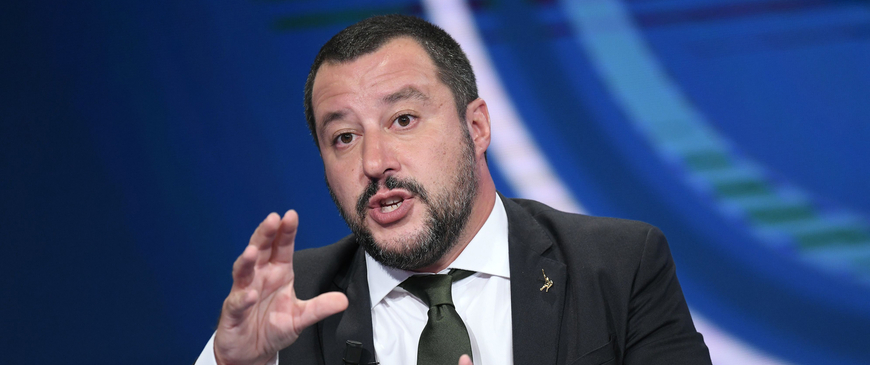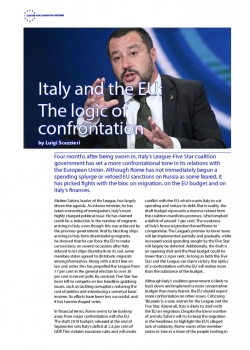
Italy and the EU: The logic of confrontation
Four months after being sworn in, Italy’s League-Five Star coalition government has set a more confrontational tone in its relations with the European Union. Although Rome has not immediately begun a spending splurge or vetoed EU sanctions on Russia as some feared, it has picked fights with the bloc on migration, on the EU budget and on Italy’s finances.
Matteo Salvini, leader of the League, has largely driven the agenda. As interior minister, he has taken ownership of immigration, Italy’s most highly charged political issue. He has claimed credit for a reduction in the number of migrants arriving in Italy, even though this was achieved by the previous government. And by blocking ships arriving in Italy from disembarking migrants, he showed that he can force the EU to make concessions; on several occasions after Italy refused to let ships disembark on its soil, some member-states agreed to distribute migrants among themselves. Along with a strict line on law and order, this has propelled the League from 17 per cent in the general election to over 30 per cent in recent polls. By contrast, Five Star has been left to compete on less headline-grabbing issues, such as tackling corruption, reducing the cost of politics and introducing a universal basic income. Its efforts have been less successful, and it has haemorrhaged votes.
Matteo Salvini, leader of the League, has largely driven the agenda.
In financial terms, Rome seems to be backing away from major confrontation with the EU. The draft 2019 budget, released at the end of September sets Italy’s deficit at 2.4 per cent of GDP. This violates eurozone rules and will create conflict with the EU, which wants Italy to cut spending and reduce its debt. But in reality, the draft budget represents a massive retreat from the coalition manifesto promises, which implied a deficit of around 7 per cent. The weakness of Italy’s financial position forced Rome to compromise. The League’s promise to lower taxes will be implemented partially and gradually, while increased social spending sought by the Five Star will largely be deferred. Additionally, the draft is an opening shot and the final budget could be lower than 2.4 per cent. As long as both the Five Star and the League can claim victory, the optics of a confrontation with the EU will matter more than the substance of the budget.
Although Italy’s coalition government is likely to back down and implement a more conservative budget than many feared, the EU should expect more confrontation on other issues. Criticising ‘Brussels’ is a vote winner for the League and the Five Star. Above all, Italy is likely to clash with the EU on migration. Despite the lower number of arrivals, Salvini will try to keep the migration in the headlines, to highlight the EU’s alleged lack of solidarity. Rome wants other member-states to take in a share of the people landing in Italy. Other member-states agreed at the June European Council to help by setting up migrant processing centres within the EU and in third countries, but there has been no progress.
Although Italy’s coalition government is likely to back down and implement a more conservative budget than many feared, the EU should expect more confrontation on other issues.
Italy’s foreign policy could also become increasingly erratic and assertive. Rome is likely to align itself increasingly with Donald Trump’s criticisms of Germany, France and the European Commission. Italy could draw closer to Russia, for instance by striking high profile business deals and signalling a willingness to ease sanctions. Italy is also likely to clash with France, which has openly criticised Rome’s migration policy. Italy blames France for reducing Italy’s clout in Libya and destabilising the country through an ill-advised push for early elections in pursuit of influence and business opportunities.
Finally, Italy’s coalition government will continue to be torn in dealing with Hungary. Angered by Prime Minister Viktor Orbán’s refusal to take in migrants from Italy, the Five Star has called for cuts in EU structural funds for Hungary and its MEPs also voted in favour of triggering the Article 7 disciplinary procedure against the country. But Salvini has pledged to work with Orbán to oppose the EU’s ‘open-door’ migration policy, a straw man given the bloc’s increasing efforts to reduce the number of people attempting to reach Europe and deport those whose asylum applications have been rejected.
The rivalry between the Five Star and League, and the popularity of EU-bashing, will continue to shape Italian politics and generate confrontation with Brussels.
The rivalry between the Five Star and the League, and the popularity of EU-bashing, will continue to shape Italian politics and generate confrontation with Brussels. While the coalition is unstable, neither a change of government nor new elections is likely until the 2019 European Parliament elections. However, in the coming years, it is possible that Italy will have a League-led government. This could result in even greater friction with the EU on migration, foreign policy and economic policy.
How relations between Italy and the EU develop depends in part on the EU’s actions. Italians are increasingly disillusioned with the EU, believing it did not show solidarity with Italy during the eurozone and migration crises. There appears to be little chance of eurozone reform, meaning that Italian economic grievances are likely to fester. However, with the migration crisis under control it would be relatively inexpensive for willing member states to set up a mechanism to share asylum-seekers between them. The League and Five Star would claim victory, but ultimately such a visible sign of European solidarity would weaken their anti-EU rhetoric.
Luigi Scazzieri is a research fellow at the Centre for European Reform.

